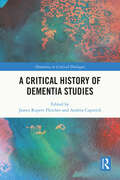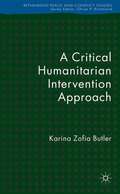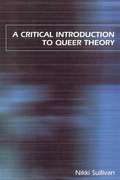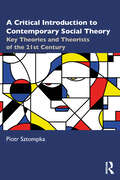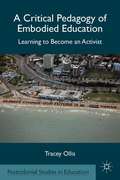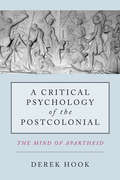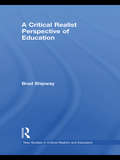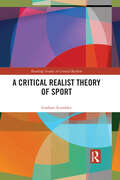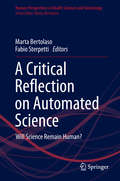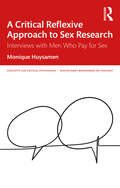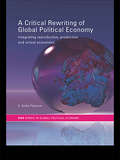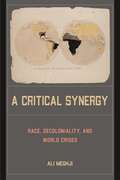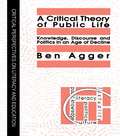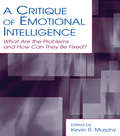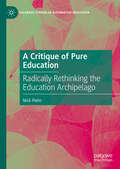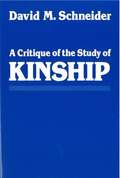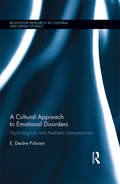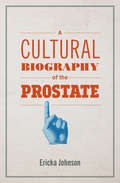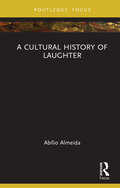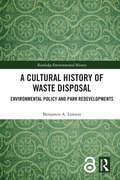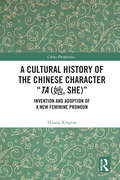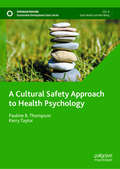- Table View
- List View
A Critical History of Dementia Studies (Dementia in Critical Dialogue)
by James Rupert Fletcher Andrea CapstickThis book offers the first ever critical history of dementia studies. Focusing on the emergence of dementia studies as a discrete area of academic interest in the late 20th and early 21st centuries, it draws on critical theory to interrogate the very notion of dementia studies as an entity, shedding light on the affinities and contradictions that characterise the field. Drawing together a collection of internationally renowned experts in a variety of fields, including people with dementia, this volume includes perspectives from education, the arts, human rights and much more. This critical history sets out the shared intellectual space of ‘dementia studies’, from which non-medical dementia research can progress. The book is intended for researchers, academics and students of dementia studies, social gerontology, disability, chronic illness, health and social care. It will also appeal to activists and practitioners engaged in social work and caregiving involved in dementia research.
A Critical Humanitarian Intervention Approach (Rethinking Peace and Conflict Studies)
by Karina Zofia Butler née PawlowskaA Critical Humanitarian Intervention Approach explores ways of reconceptualising security in terms of Ken Booth's Theory of World Security. This approach, focusing on human development more broadly can improve upon the theoretical and practical limitations of solidarist theories on the subject of humanitarian intervention.
A Critical Introduction To Queer Theory
by Nikki SullivanA Critical Introduction to Queer Theory explores the ways in which sexuality, subjectivity and sociality have been discursively produced in various historical and cultural contexts. The book begins by putting gay and lesbian sexuality and politics in historical context and demonstrates how and why queer theory emerged in the West in the late twentieth century. Sullivan goes on to provide a detailed overview of the complex ways in which queer theory has been employed, covering a diversity of key topics including: race, sadomasochism, straight sex, fetishism, community, popular culture, transgender, and performativity. Each chapter focuses on a distinct issue or topic, provides a critical analysis of the specific ways in which it has been responded to by critics (including Freud, Foucault, Derrida, Judith Butler, Jean-Luc Nancy, Adrienne Rich and Laura Mulvey), introduces key terms, and uses contemporary cinematic texts as examples.
A Critical Introduction to Contemporary Social Theory: Key Theories and Theorists of the 21st Century
by Piotr SztompkaExamining the core sociological theories that have emerged in the first two decades of the current century, A Critical Introduction to Contemporary Social Theory outlines their attempts to answer the most fundamental questions of the discipline, from the nature of social order to the mechanisms of social change. Through a careful exploration of the history of modern social theory, Piotr Sztompka lays the critical groundwork for investigating the development of contemporary social theory from its founding fathers in the 19th century, through the rich contributions of the 20th century, known as "the golden age of theory," up to the most recent developments and illuminates how it is both anchored in and a critique of previous attempts to theorize foundational questions to social being and action. Contemporary theory, the book argues, is now moving toward analysis of action, interpersonal relations, social and epistemological realism, and multivalent mechanisms at the root of social phenomenon.Major social theoretical thinkers like Anthony Giddens, Pierre Bourdieu, Jeffrey Alexander, Randall Collins, Jonathan Turner, Hans Joas, Ulrich Beck, Erving Goffman, and others are presented and evaluated as significant contributors to contemporary social theory, while pointing toward future possibilities for social theory in the current century. This will be a key resource for undergraduate and graduate students in sociology, social theory, and contemporary cultural studies.
A Critical Pedagogy of Embodied Education
by Tracey OllisExplores the differences and similarities between two groups: lifelong activists who have been engaged in campaigns and socials movements over many years and circumstantial activists, those protestors who come to activism due to a series of life circumstances. Outlines the pedagogy of activism and the process of learning to become an activist.
A Critical Psychology of the Postcolonial: The Mind of Apartheid
by Derek HookAn oft-neglected element of postcolonial thought is the explicitly psychological dimension of many of its foundational texts. This unprecedented volume explores the relation between these two disciplines by treating the work of a variety of anti-colonial authors as serious psychological contributions to the theorization of racism and oppression. This approach demonstrates the pertinence of postcolonial thought for critical social psychology and opens up novel perspectives on a variety of key topics in social psychology. These include: the psychology of embodiment and racialization resistance strategies to oppression 'extra-discursive’ facets of racism the unconscious dimension of stereotypes the intersection of psychological and symbolic modalities of power. In addition, the book makes a distinctive contribution to the field of postcolonial studies by virtue of its eclectic combination of authors drawn from anti-apartheid, psychoanalytic and critical social theory traditions, including Homi Bhabha, Steve Biko, J.M. Coetzee, Frantz Fanon, Julia Kristeva, Chabani Manganyi and Slavoj Żiżek. The South African focus serves to emphasize the ongoing historical importance of the anti-apartheid struggle for today’s globalized world. A Critical Psychology of the Postcolonial is an invaluable text for social psychology and sociology students enrolled in courses on racism or cultural studies. It will also appeal to postgraduates, academics and anyone interested in psychoanalysis in relation to societal and political issues.
A Critical Realist Perspective of Education (New Studies in Critical Realism and Education (Routledge Critical Realism))
by Brad ShipwayThis book clearly and comprehensively explores the capability of critical realism to throw new light on educational theory. It firstly investigates the convergence and divergence between two forms of critical realism, which have not previously been cross-examined. This task allows the book to outline the key characteristics that are necessary for a theological position to claim the term "critical realist". The remainder of the text deals with the implications of critical realism for the enterprise of education. This "enterprise" is taken to include the thoughts and actions of students, classroom teachers, principals, educational administrators, policy makers, teacher educators, and philosophers of education. This final part of the book widens the scope of evaluating education from a critical realist perspective. It utilises the convergent ideas of Collier, Walker, and Corson on "power" as a platform to propose a critical realist perspective on education. With attention paid to the fundamentals of critical realism, and education theory, A Critical Realist Perspective of Education is an ideal text for undergraduates as well as postgraduates and professionals with an interest in broadening their understanding of education theory.
A Critical Realist Theory of Sport (Routledge Studies in Critical Realism)
by Graham ScamblerThis book argues that sport in the era of global or financialised capitalism has undergone a process of fracturing, which requires a re-assessment of longstanding and consensual accounts of traditional-to-modern sporting activity. Considering rival concepts of sport, it presents detailed, illustrative studies of various types of sporting or athletic activity – including soccer, cricket, rugby and track and field – to advance an alternative sociological understanding of sport rooted in the philosophies and theories of critical realism and critical theory. As such, A Critical Realist Theory of Sport will appeal to scholars of sociology and social theory with interests in sport, research methods and critical realist thought.
A Critical Reflection on Automated Science: Will Science Remain Human? (Human Perspectives in Health Sciences and Technology #1)
by Marta Bertolaso Fabio SterpettiThis book provides a critical reflection on automated science and addresses the question whether the computational tools we developed in last decades are changing the way we humans do science. More concretely: Can machines replace scientists in crucial aspects of scientific practice? The contributors to this book re-think and refine some of the main concepts by which science is understood, drawing a fascinating picture of the developments we expect over the next decades of human-machine co-evolution. The volume covers examples from various fields and areas, such as molecular biology, climate modeling, clinical medicine, and artificial intelligence. The explosion of technological tools and drivers for scientific research calls for a renewed understanding of the human character of science. This book aims precisely to contribute to such a renewed understanding of science.
A Critical Reflexive Approach to Sex Research: Interviews with Men Who Pay for Sex (Concepts for Critical Psychology)
by Monique HuysamenA Critical Reflexive Approach to Sex Research is a methodologically focused book that offers rich insights into the, often secret, subjectivities of men who pay for sex in South Africa. The book centres on the interview context, outlining a critical reflexive approach to understanding how knowledge is co-produced by both the interviewer and the participant in research about sex. By attending to the complex dynamics of the research interview, this book examines the historic and contemporary relationship between sex work, race, coloniality, sexuality, masculinity, femininity, whorephobia, and discourses of disease and contagion. It draws on both empirical interview data and Huysamen’s entries in her research journal to offer a unique approach to building critical reflexivity into every phase of the research process. The critical reflexive approach uses an assemblage of poststructuralist and psychoanalytic theories and practices which together provide tools to interrogate how interview dynamics facilitate, shape, and restrain the meaning that is produced within the interview. This book will be a valuable resource for anyone interested in researching sex work from intersectional and feminist decolonial perspectives as it probes critical questions surrounding how men make meaning of paying for sex, their motivations for doing so, and how they negotiate their identities in relation to this stigmatised practice. It provides a unique offering to researchers working on sexual, secret, and stigmatised topics, providing them with a specific set of tools and resources to incorporate reflexivity into their own sex research. Encouraging the reader to look widely to draw on an array of theories and frameworks across disciplines, this is fascinating reading for students and researchers in critical psychology, research methods, and the social sciences.
A Critical Rewriting of Global Political Economy: Integrating Reproductive, Productive and Virtual Economies (RIPE Series in Global Political Economy)
by V. Spike PetersonMoving beyond a narrow definition of economics, this pioneering book advances our knowledge of global political economy and how we might critically respond to it.V. Spike Peterson clearly shows how two key features of the global economy increasingly determine everyday lives worldwide. The first is explosive growth in financial markets that shape business decision-making and public policy-making, and the second is dramatic growth in informal and flexible work arrangements that shape income-generation and family wellbeing. These developments, though widely recognized, are rarely analyzed as inextricable and interacting dimensions of globalization. Using a new theoretical model, Peterson demonstrates the interdependence of reproductive, productive and virtual economies and analyzes inequalities of race, gender, class and nation as structural features of neoliberal globalization. Presenting a methodologically plural, cross-disciplinary and well-documented account of globalization, the author integrates marginalized and disparate features of globalization to provide an accessible narrative from a postcolonial feminist vantage point.
A Critical Synergy: Race, Decoloniality, and World Crises
by Ali MeghjiPractitioners of decolonial theory and critical race theory (CRT) often use one or the other, but not both. In his provocative book, A Critical Synergy, Ali Meghji suggests using the two theories in tandem rather than attempting to hierarchize or synthesize them. Doing so allows for the study of social phenomena in a way that captures their global and historical roots, while acknowledging their local, national, and contemporary particularities. The differences between decolonial thought and CRT, Meghji insists, does not necessarily imply one approach is stronger. Rather, he asserts, they often provide alternative but not incompatible viewpoints of the same social problem. Meghji presents case studies of capitalism, the COVID-19 pandemic, climate crisis, and twenty-first-century far-right populism to show that with both theories, we can understand more, as insights may be lost by using only one. Meghji is not calling for a universal theoretical synthesis in A Critical Synergy, but rather a practice that can help open sociology and social science to the tradition of pluriversality much more broadly.
A Critical Theory Of Public Life: Knowledge, Discourse And Politics In An Age Of Decline (Critical Perspectives On Literacy And Education Ser. #Vol. 3)
by Ben AggerFirst Published in 1991. Routledge is an imprint of Taylor & Francis, an informa company.
A Critique of Emotional Intelligence: What Are the Problems and How Can They Be Fixed? (Applied Psychology Series)
by Kevin R. MurphyThis book analyzes important criticisms of the current research on Emotional Intelligence (EI), a topic of growing interest in the behavioral and social sciences. It looks at emotional intelligence research and EI interventions from a scientific and measurement perspective and identifies ways of improving the often shaky foundations of our current conceptions of emotional intelligence. With a balanced viewpoint, A Critique of Emotional Intelligence includes contributions from leading critics of EI research and practice (e.g., Frank Landy, Mark Schmit, Chockalingam Viswesvaran), proponents of EI (e.g., Neal Ashkanasy, Catherine Daus), as well as a broad range of well-informed authors. Proponents claim that EI is more important in life than academic intelligence, while opponents claim that there is no such thing as emotional intelligence. Three key criticisms that have been leveled at emotional intelligence include: (1) EI is poorly defined and poorly measured; (2) EI is a new name for familiar constructs that have been studied for decades; and (3) claims about EI are overblown. While the book presents these criticisms, the final section proposes ways of improving EI research and practice with EI theories, tests, and applications.
A Critique of Pure Education: Radically Rethinking the Education Archipelago (Palgrave Studies in Alternative Education)
by Nick PeimThis book analyses educational theory in order to offer an alternative view of the history of education in modernity. It provides a new understanding of education as a phenomenon that draws on powerful lines of thinking, but also makes a significant departure from the conventional wisdom of both education policy and education studies. These perspectives offer an original and challenging account of what education is and of what politics has become, providing resources to rethink education as a fundamental dimension of the unprecedented political order of our time. It does this through a focus on what it takes to be the key, complex and expanding political apparatus of education. Taking the school to be the paradigm institution of modernity and beyond, the book proposes that we see the school as central to contemporary political ontology.
A Critique of the Study of Kinship
by David M. SchneiderSchneider views kinship study as a product of Western bias and challenges its use as the universal measure of the study of social structure.
A Cultural Approach to Emotional Disorders: Psychological and Aesthetic Interpretations (Routledge Research in Cultural and Media Studies)
by E. Deidre PribramIn her latest contribution to the growing field of emotion studies, Deidre Pribram makes a compelling argument for why culturalist approaches to the study of emotional "disorders" continue to be eschewed, even as the sociocultural and historical study of mental illness flourishes. The author ties this phenomenon to a tension between two fundamentally different approaches to emotion: an individualist approach, which regards emotions as the property of the individual, whether biologically or psychologically, and a culturalist approach, which regards emotions as collective, social processes with distinctive histories and meanings that work to produce particularized subjects. While she links a strong preference for the individualist construct in Western culture to the rise of the psychological and psychiatric disciplines at the turn of the twentieth century, Pribram also engages with a diverse set of case studies tied to psychological and aesthetic discourses on emotions. These range from Van Gogh’s status as emotionally disordered to the public, emotional aesthetics of 19th century melodrama to the diagnostic categories of the DSMs and the fear of "globalizing" emotional disorders in the 21st century. This genuinely interdisciplinary approach makes for a text with potential application in a wide range of disciplines within cultural studies, including sociocultural and historical analysis of psychiatry and psychology, gender theory, subject and identity theory, popular culture studies, and history and theory of the arts.
A Cultural Biography of the Prostate
by Ericka JohnsonWhat contemporary prostate angst tells us about how we understand masculinity, aging, and sexuality.We are all suffering an acute case of prostate angst. Men worry about their own prostates and those of others close to them; women worry about the prostates of the men they love. The prostate--a gland located directly under the bladder--lurks on the periphery of many men's health issues, but as an object of anxiety it goes beyond the medical, affecting how we understand masculinity, aging, and sexuality. In A Cultural Biography of the Prostate, Ericka Johnson investigates what we think the prostate is and what we use the prostate to think about, examining it in historical, cultural, social, and medical contexts. Johnson shows that our ways of talking about, writing about, imagining, and imaging the prostate are a mess of entangled relationships. She describes current biomedical approaches, reports on the "discovery" of the prostate in the sixteenth century and its later appearance as both medical object and discursive trope, and explores present-day diagnostic practices for benign prostate hyperplasia--which transform a process (urination) into a thing (the prostate). Turning to the most anxiety-provoking prostate worry, prostate cancer, Johnson discusses PSA screening and the vulnerabilities it awakens (or sometimes silences) and then considers the presence of the absent prostate--how the prostate continues to affect lives after it has been removed in the name of health.
A Cultural History Of The British Census
by Kathrin LevitanThe book explores the hotly disputed process by which the census was created and developed and examines how a wide cast of characters, including statisticians, novelists, national and local officials, political and social reformers, and journalists responded to and used the idea of a census.
A Cultural History of Laughter (Morality, Society and Culture)
by Abílio AlmeidaIs laughter a sin? Or is it man’s best medicine? Is laughter now trivialised, mechanised or even weaponised by contemporary media? This book explores the social history of laughter in the West, from classical antiquity to the present day.Engaging with a range of thought from Plato to Nietzsche, it moves from classical to modern thought, considering the changing emotional climate of societies – including the postmodern "dictatorship of happiness" – and the role played by the technological changes of the last century in shaping our interpretation of laughter.A broad, historical study of the physical and emotional aspects of laughter, as well as its social role, A Cultural History of Laughter will appeal to scholars of sociology, history and cultural studies, among other fields of knowledge.
A Cultural History of Rio de Janeiro after 1889: Glorious Decadence
by Tom WinterbottomThis book studies architecture andliterature of Rio de Janeiro, the "Marvellous City," from the revolution of1889 to the Olympics of 2016, taking the reader on a journey through thehistory of the city. This study offers a wide-ranging and thought-provokinginsight that moves from ruins to Modernism, from the past to the future, fromfutebol to fiction, and from beach to favela, to uncover the surprisingfeature--decadence--at the heart of this unique and seemingly timeless urbanworld. An innovative and in-depth study of buildings, books, and characters inthe city's modern history, this fundamental new work sets the reader in theglorious world of Rio de Janeiro.
A Cultural History of Spanish Speakers in Japan (Historical and Cultural Interconnections between Latin America and Asia)
by Araceli TinajeroBeginning in 1990, thousands of Spanish speakers emigrated to Japan. A Cultural History of Spanish Speakers in Japan focuses on the intellectuals, literature, translations, festivals, cultural associations, music (bolero, tropical music, and pop, including reggaeton), dance (flamenco, tango and salsa), radio, newspapers, magazines, libraries, and blogs produced in Spanish, in Japan, by Latin Americans and Spaniards who have lived in that country over the last three decades. Based on in-depth research in archives throughout the country as well as field work including several interviews, Japanese-speaking Mexican scholar Araceli Tinajero uncovers a transnational, contemporary cultural history that is not only important for today but for future generations.
A Cultural History of Waste Disposal: Environmental Policy and Park Redevelopments (Routledge Environmental History)
by Benjamin A. LawsonThis book offers a historical analysis of landfill sites in New York City, Greater Toronto, and Greater Tel Aviv, and uses them as case studies to emphasize the international and global scale of issues concerning waste disposal and park redevelopments.New York, Toronto, and Tel Aviv are currently redeveloping giant landfills into parks to much fanfare. The park redevelopments may be seen as an attempt to erase or assuage the decades of problematic waste-disposal policy that led to the creation of such large landfills. Booster rhetoric underscores this point, such as promoting how the parks will be a “green lung” for the city. This book contextualizes these redevelopments by offering a historical analysis, providing a greater understanding of the past, current, and future potential issues. It goes on to analyze the language and media coverage surrounding former waste sites becoming park redevelopments, including how cities use art to promote their image and gain cultural relevance. By engaging with both the works of waste historians and literature on waste and discard studies, the book provides theoretical models for analyzing the role of power in municipal systems, as well as human and ecological impacts on waste. It concludes with an analysis of the features necessary for landfill parks to be successful. This book will be useful for scholars, researchers, and academics studying waste studies, the environment, cities, and sustainable development, as well as for policymakers and environmental/eco artists.
A Cultural History of the Chinese Character “Ta: Invention and Adoption of a New Feminine Pronoun (China Perspectives)
by Huang XingtaoThis book offers a thorough examination of the history of a Chinese female pronoun – the Chinese character "Ta (她, She)" and demonstrates how the invention and identification of this new word is inextricably intertwined with matters of sociocultural politics. The Chinese character Ta for the third-person feminine singular pronoun was introduced in the late 1910s when the voices of women’s liberation rang out in China. The invention and dissemination of this word not only reflected an ideological gendering of the Chinese script but also provoked heated academic and popular debate well into the 1930s. Thus, the history of Ta provides a prism through which to explore modern Chinese history. The author provides an ambitious and informed examination of how Ta was invented and promoted in relation to the gender equality movement, the politics of neologism, and other domestic elements and international catalysts. This book is the first major work to survey Ta’s creation. It draws on diverse sources, including interviews with eight historians who experienced the popularisation of Ta as youths in the 1930s and 40s. This book will be an essential read for students and scholars of East Asian Studies, Chinese Cultural History, and those who are interested in the history of China.
A Cultural Safety Approach to Health Psychology (Sustainable Development Goals Series)
by Kerry Taylor Pauline B. ThompsonThis book applies the concept of cultural safety to the field of health psychology in a US context as a means to achieve health equity. First developed in New Zealand by Māori midwives, cultural safety can be understood as both a philosophy and a way of working within a social model of health as an alternative approach to understanding health and illness. Health, social, and human service professionals are at the forefront of interactions with a range of people who often experience disparities in health and social outcomes. In thirteen chapters, the authors explore the social determinants of health; the practices and pitfalls of intercultural communication; and community capacity, resilience, and strengths as correctives to discourses of deficiency. The book concludes with a comparative look at cultural safety in different national contexts, and a discussion of the value of critical reflective practice. Complete with chapter objectives, scenarios, suggested readings and films, and questions for critical thinking, this book is an invaluable resource for students and practitioners alike in health psychology and related fields, and a vital contribution to the literature on cultural safety.
